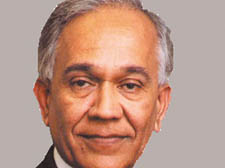|
|
 |
| |

Dugald Gonsal has spent about seven weeks at the Royal Free this year |
A healthy hospital needs more than medical staff
Dugald Gonsal arguesthat Royal Free senior managers should try being ‘mystery patients’
I HAVE lived in the shadow of the Royal Free Hospital for many years, though until earlier this year my dealings with it were few and far between.
Nevertheless, my experiences of the hospital were, as now, always excellent in terms of medical care and attention.
However, my experiences of the administrative ‘support services’ in which the medical services are embedded reveals that they are of significantly poorer quality.
On many occasions the utter frustration of dealing with shortcomings in the administrative support services fired me up to want to make formal complaints. A few days later, however, the enthusiasm would wane and I would retreat from complaint mode, largely because I was aware that most complaint systems are time-consuming processes intended to deter all but the most resolute complainant.
With hindsight, I may not have done the Royal Free any good at all by this forgiving attitude, because my recent experience suggests that nothing has really changed. But I feel that now is the time to try to do something about it.
Since the middle of February I have spent about seven weeks at the Royal Free on three separate occasions. As an in-patient was aware of clearly identifiable groups of people providing medical and associate care. While the professional medical and nursing services were exceptionally competent, the level of service provided by administrative support was far from satisfactory.
Let me recount the administrative support services’ failures I experienced, some of which I still retain documentary proof of.
Hospital appointments are a fertile area for such failures. I do not understand why the Royal Free does not use telephones or email to confirm attendance at an appointment. Often letters are lost and it is not uncommon to find that an appointment has been cancelled or that I failed to attend because I was unaware of an appointment.
Then there’s the argument that “it’s a computer fault”. On a recent occasion I have had letters asking me to contact the Royal Free to make an appointment following a request from my GP. When contact was made I was advised that I received the letter as a result of a computer error but that I would be contacted by the Royal Free to make an appointment.
After four repeats of this incident and I gave up and binned the letters. I heard nothing further about my appointment.
Recently, I was admitted to Accident and Emergency with MRSA. Shortly before midday I was prepared by staff to receive intravenous antibiotics, and waited to be taken to a ward for treatment.
Nearly 12 hours later nothing had happened, and I was held in the almost dungeon-like cell of George Qvist Ward, (with one of the filthiest lavatories I had ever seen). I decided then to make my presence felt and within 10 minutes I was taken up to the ward. Enquiries from the nurse who admitted me in the early hours of the next day revealed that they had a bed for me and had been waiting since 2pm for my arrival.
A few weeks earlier I had to have a scan and was taken down to the ground floor in a wheelchair. After the scan I was ‘parked’ in a corridor. Nearly an hour later I was still in the wheelchair, shaking with cold.
In anger and desperation I forced myself out of the wheelchair and informed the medical staff that I was going to walk up to the ninth floor as I was far too cold to continue sitting in the corridor.
Again, within minutes, two people turned up to take me to the ward.
As someone who has had the experience of managing large numbers of staff I am aware that those providing support services often feel undervalued, bored and marginalised by the management and professional hierarchy. It is usually the fault of senior managers that this occurs.
I used a management technique to deal with this while at work, simply turning up unannounced and unexpectedly where a service I was responsible for was being delivered, making myself known, and asking to be told what was happening.
Very senior managers at the Royal Free should try being a ‘mystery patient’ a few times a week.
During the seven weeks I was at the Royal Free I was visited about once a day by senior professional medical staff and, in the ward I was on, I often saw the matron and/or the charge nurse. However, I never once encountered any senior manager enquiring whether all was well with the patients.
The Royal Free should encourage more people to complain. It is only by confronting complaints that the Royal Free can expect to become the equivalent of a highly successful ‘6-Sigma’ company similar to those in the US, Japan and Europe. It deserves to be in that class but is held back by its poor administrative ‘support services’.
n Dugald Gonsal was Camden’s chief engineer until his retirement in 2000 after 35 years’
service. He runs www.mylocalcouncil.org |
 |
|
| |
|
 |
|

